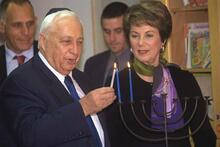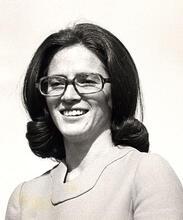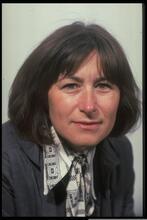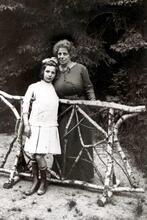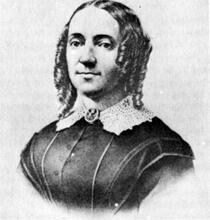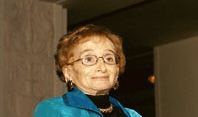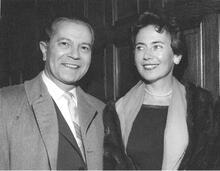Ellen Phyllis Hellmann
Ellen Phyllis Hellmann was born in South Africa in 1908. She attended the University of the Witwatersrand as a student of social anthropology, where she conducted research among a community of African slum dwellers in Johannesburg; she later became the first woman to obtain a D.Phil. degree at the University. The appalling living conditions she saw through her research prompted Hellman’s entry into activism. She played a crucial role in the South African Institute of Race Relations, serving as its president from 1954 to 1956 and heading many of its committees. Her opposition to the apartheid regime led her into politics. She was a founding member of the liberal Progressive Party, held office in the South African Institute for International Affairs, and encouraged South African Jews to be active in issues of inequality.
Overview
Dr. Ellen Hellmann has devoted her life to South Africa and all its peoples. Her services to Africans are recognized and appreciated in South Africa and internationally; her devotion to public duty is amazing. She is an outstanding authority on race relations and is in the forefront in the battle for African advancement.
(Sir Arthur Snelling, British Ambassador to South Africa, on the occasion of the presentation to Ellen Hellmann in 1970 of the Royal African Society’s medal for “dedicated service to Africa”)
The presentation ceremony took place in the Johannesburg headquarters of the South African Institute of Race Relations (SAIRR). The venue was most appropriate as Ellen Hellmann had been identified with the work of the SAIRR since its inception on May 9, 1929, and had played a crucial role in the Institute’s objective of a just and multi-racial society in South Africa. She headed many of the various committees of the SAIRR and was its president from 1954 to 1956. As chairperson of the important Research Committee, she set high standards for precise research and contributed enormously to the excellent reputation enjoyed by the SAIRR publications and its annual Race Relations Survey.
Early Life and Accomplishments
Ellen Hellmann was born in Johannesburg, South Africa on August 25, 1908. She was the daughter of Bernard Kaumheimer, who immigrated to South Africa from Bavaria, Germany, in 1894, and Chlothilde Theilheimer. Educated at Barnato Park and the classical section of the Commercial High School, she then attended the University of the Witwatersrand, where, as a student of social anthropology, she came into contact with Winifred Hoernle, who encouraged Ellen to do research among urban Africans. For her master’s degree, Hellmann conducted research among a community of African slum dwellers living near the center of Johannesburg. The results of that research, which involved daily visits to the slum over a period of a year, were published in Rooiyard: A Sociological Survey of an Urban Native Slum (1948; reprinted 1969).
In March 1932 she married Joseph Michael Hellmann, an attorney, and they had one daughter. Michael Hellmann died in 1941; she married Dr. Bodo Koch in 1948.
In 1940 Ellen Hellmann became the first woman to obtain a D.Phil. degree at the University of the Witwatersrand. Her dissertation, Early school leaving among African school children and the occupational opportunities open to the African juveniles, was published as Problems of Urban Bantu Youth (1940).
Activism and Political Career
Her research into the appalling conditions under which urban black Africans lived imbued Hellmann with the desire to attempt to play a part in alleviating those conditions. She joined the multiracial Joint Council of Europeans and Bantu, serving first as secretary and later as chairperson, but she was to make her greatest contribution as a prominent figure in the SAIRR. As a leading executive member of that organization, she brought her highly respected academic skills to the compilation and submission of evidence to various important government commissions. Among these were the Commission for Socio-economic Development of the Native Areas of South Africa (1955), known as the Tomlinson Committee, and the Commission of Inquiry into the Riots at Soweto and Elsewhere, which operated from June 16, 1976, to February 28, 1977, known as the Cillie Committee.
Apart from her work at the SAIRR Hellmann chaired the Isaacson Bursary Fund for Africans, linked to the SAIRR, and lectured at the Jan Hofmeyr School of Social Work, which trained Africans as social workers. She was also honorary treasurer of an African Welfare center in Alexandra, a black township on the outskirts of Johannesburg. Her opposition to the apartheid regime led her into active politics and she was a founding member of the liberal Progressive Party, serving on its executive from 1959 to 1971. She also held office in the Witwatersrand branch of the South African Institute for International Affairs and was involved in many Jewish organizations, including the South African Board of Deputies, the representative body of South African Jewry, of which she was an executive member from 1940 to 1950.
Personal Beliefs and Awards
Ellen Hellmann was of the firm opinion that South African Jews could not separate the problems that concerned the Jewish community from those concerning all South Africans, regardless of color or creed. No group could view its own future without an awareness of the tensions and disunity prevailing in South African society at large and Jewish South Africans, she felt, needed to be more aware of the necessity for engagement with the actual conditions prevailing in South Africa.
The University of the Witwatersrand awarded Ellen Hellmann an Honorary Doctorate in Law in 1968 and in 1970 she received the gold medal of the Royal African Society (Great Britain) for “dedicated service to Africa.”
These were fitting tributes to a compassionate and vigorous fighter who was committed to the peaceful struggle for a broad-based society of justice and equal opportunity.
Ellen Hellmann died in Johannesburg on November 1982 at the age of seventy-four.
Selected Works
Problems of Urban Bantu Youth. Johannesburg: 1940;
Rooiyard: A Sociological Survey of an Urban African Slum. Johannesburg: 1948. Reprinted 1969; editor.
Handbook on Race Relations in South Africa. Johannesburg: 1949. Reprinted 1969;
Sellgoods: A Sociological Survey of an African Commercial Labor Force. Johannesburg: 1953;
Soweto: Johannesburg’s African City. Johannesburg: 1969.
Obituaries
Argus, November 8, 1982.
Star, November 8, 1982.
Rand Daily Mail, November 8, 1982.
South African Jewish Times, November 12, 1982.
Verwey, E. J., ed. NewDictionary of South African Biography. Pretoria: 1995.
Jewish Affairs 25 (12): December 1970.
Obituaries
Argus, November 8, 1982.
Star, November 8, 1982.
Rand Daily Mail, November 8, 1982.
South African Jewish Times, November 12, 1982.

